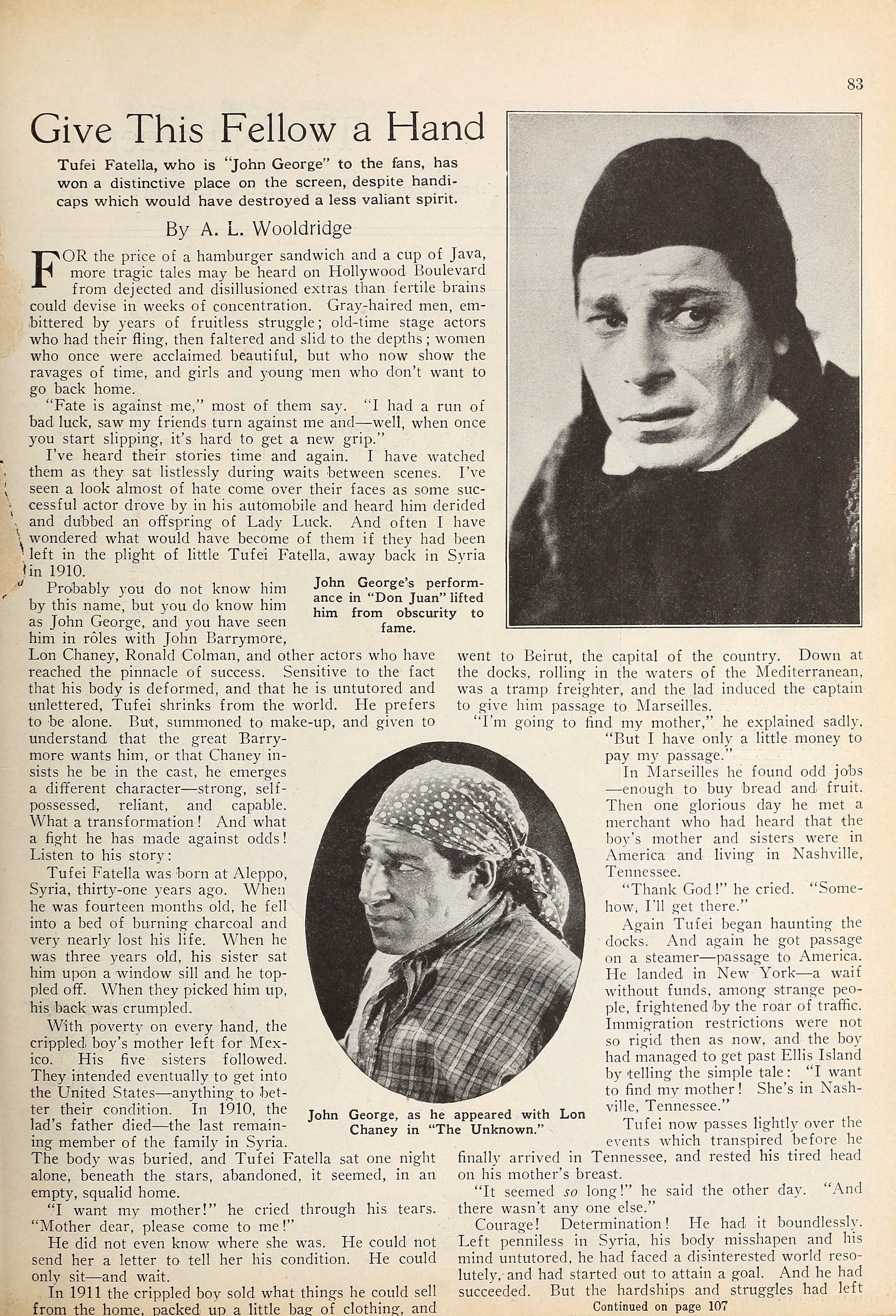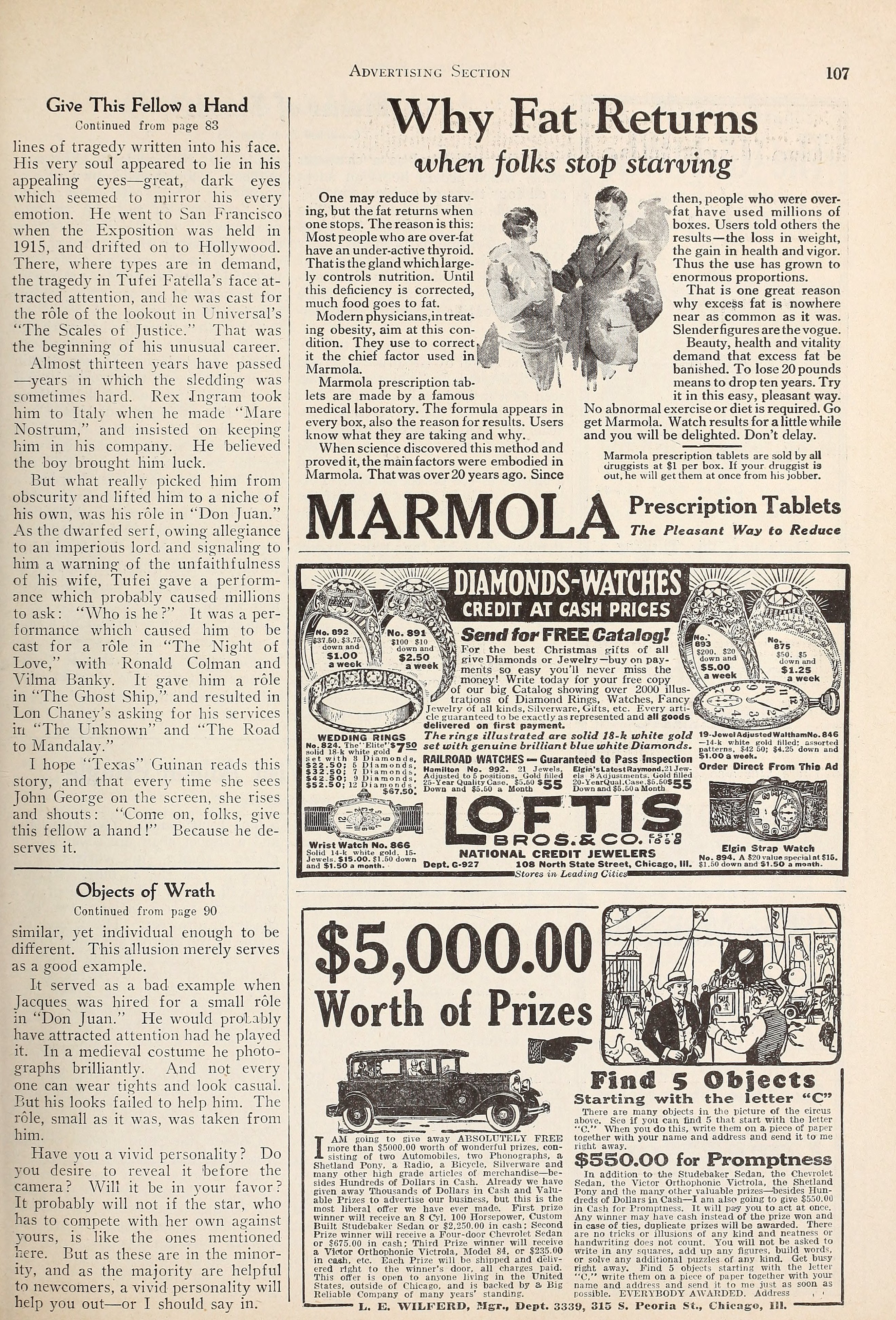John George — Give This Fellow a Hand (1928) 🇺🇸

For the price of a hamburger sandwich and a cup of Java, more tragic tales may be heard on Hollywood Boulevard from dejected and disillusioned extras than fertile brains could devise in weeks of concentration. Gray-haired men, embittered by years of fruitless struggle; old-time stage actors who had their fling, then faltered and slid to the depths; women who once were acclaimed; beautiful, but who now show the ravages of time, and girls and young men who don’t want to go back home.
by A. L. Wooldridge
“Fate is against me,” most of them say. “I had a run of bad luck, saw my friends turn against me and — well, when once you start slipping, it’s hard to get a new grip.”
I’ve heard their stories time and again. I have watched them as they sat listlessly during waits between scenes. I’ve seen a look almost of hate come over their faces as some successful actor drove by in his automobile and heard him derided and dubbed an offspring of Lady Luck. And often I have i wondered what would have become of them if they had been left in the plight of little Tufei Fatella, away back in Syria in 1910.
Probably you do not know him by this name, but you do know him as John George, and you have seen him in roles with John Barrymore, Lon Chaney, Ronald Colman, and other actors who have reached the pinnacle of success. Sensitive to the fact that his body is deformed, and that he is untutored and unlettered, Tufei shrinks from the world. He prefers to be alone. But, summoned to make-up, and given to understand that the great Barrymore wants him, or that Chaney insists he be in the cast, he emerges a different character — strong, self-possessed, reliant, and capable. What a transformation! And what a fight he has made against odds! Listen to his story:
Tufei Fatella was born at Aleppo, Syria, thirty-one years ago. When he was fourteen months old, he fell into a bed of burning charcoal and very nearly lost his life. When he was three years old, his sister sat him upon a window sill and he toppled off. When they picked him up, his back was crumpled.
With poverty on every hand, the crippled, boy’s mother left for Mexico. His five sisters followed. They intended eventually to get into the United States — anything to better their condition. In 1910, the lad’s father died — the last remaining member of the family in Syria. The body was buried, and Tufei Fatella sat one night alone, beneath the stars, abandoned, it seemed, in an empty, squalid home.
“I want my mother!” he cried through his tears. “Mother dear, please come to me!”
He did not even know where she was. He could not send her a letter to tell her his condition. He could only sit — and wait.
In 1911 the crippled boy sold what things he could sell from the home, packed up a little bag of clothing, and went to Beirut, the capital of the country. Down at the docks, rolling in the waters of the Mediterranean, was a tramp freighter, and the lad induced the captain to give him passage to Marseilles.
“I’m going to find my mother,” he explained sadly.
“But I have only a little money to pay my passage.”
In Marseilles he found odd jobs — enough to buy bread and fruit. Then one glorious day he met a merchant who had heard that the boy’s mother and sisters were in America and living in Nashville, Tennessee.
“Thank God!” he cried. “Somehow, I’ll get there.”
Again Tufei began haunting the docks. And again he got passage on a steamer — passage to America. He landed in New York — a waif without funds, among strange people, frightened by the roar of traffic. Immigration restrictions were not so rigid then as now, and the boy had managed to get past Ellis Island by telling the simple tale: “I want to find my mother! She’s in Nashville, Tennessee.”
Tufei now passes lightly over the events which transpired before he finally arrived in Tennessee, and rested his tired head on his mother’s breast.
“It seemed so long!” he said the other day. “And there wasn’t any one else.”
Courage! Determination! He had it boundlessly. Left penniless in Syria, his body misshapen and his mind untutored, he had faced a disinterested world resolutely, and had started out to attain a goal. And he had succeeded. But the hardships and struggles had left lines of tragedy written into his face. His very soul appeared to lie in his appealing eyes — great, dark eyes which seemed to mirror his every emotion. He went to San Francisco when the Exposition was held in 1915, and drifted on to Hollywood. There, where types are in demand, the tragedy in Tufei Fatella’s face attracted attention, and he was cast for the role of the lookout in Universal’s “The Scales of Justice.” That was the beginning of his unusual career.
Almost thirteen years have passed — years in which the sledding was sometimes hard. Rex Ingram took him to Italy when he made Mare Nostrum, and insisted on keeping him in his company. He believed the boy brought him luck.
But what really picked him from obscurity and lifted him to a niche of his own, was his role in Don Juan. As the dwarfed serf, owing allegiance to an imperious lord, and signaling to him a warning of the unfaithfulness of his wife, Tufei gave a performance which probably caused millions to ask: “Who is he?” It was a performance which caused him to be cast for a role in The Night of Love, with Ronald Colman and Vilma Bánky. It gave him a role in “The Ghost Ship,” and resulted in Lon Chaney’s asking for his services in The Unknown and The Road to Mandalay.
I hope “Texas” Guinan reads this story, and that every time she sees John George on the screen, she rises and shouts: “Come on, folks, give this fellow a hand!” Because he deserves it.

John George’s performance in Don Juan lifted him from obscurity to fame.
John George, as he appeared with Lon Chaney in The Unknown.
[b]

Collection: Picture Play Magazine, December 1928
